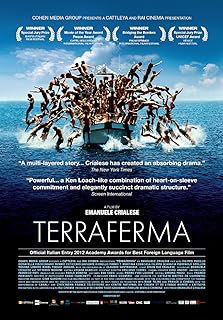内陆/内地/大陆
導演: 艾曼紐爾·克里亞勒斯編劇: 艾曼紐爾·克里亞勒斯 Vittorio Moroni
演員: 多納泰拉菲諾基亞羅 貝培費奥雷羅 克勞迪奧‧桑塔馬利亞

2012-04-12 20:34:10
Making money in a globalized world seems good, but the unwanted always follows.
************這篇影評可能有雷************
Who says the younger generation is more prone to new trends, and the older generation is always conservative? Globalization and foreigners are new, but they are not always found favorable. The two European films thematise the African illegal immigrants, but in opposite moods. Yet both films show that the elderly are more hospitable to foreigners than the younger generation, even though those foreigners are the unwelcome groups in society. Terraferma was situated in an island in Italy. The old grandfather was a fisherman, unwilling to give up his boat and his vocation although that did not earn much. He fished with his grandson, whose father was dead. The second son of the old man would rather make the bay a tourist site. One day the grandfather and the grandson saw a group of illegal immigrants floating in the sea, some threw themselves into water, so the grandfather took them to the ship and sent them to coast. That broke the law of Italy but to the grandfather, there was a higher 「law of the sea」 that one shall never see the others drowning. That bought trouble to the grandfather, his ship was then sealed, and the grandson got perplexed. The grandpa even kept a pregnant woman with her son among those illegal immigrants in his house, and helped her labour. This shows the conflict between humanity to 「help the helpless」 and the civil responsibility to obey the law and social order.
Le havre is also about a nice old man helping the helpless illegal immigrants. But it is a fairy tale in the context of globalization. If the plot of Terraferma follows the Murphy’s Law that 「what could go wrong goes wrong」, Le havre just goes to the opposite, it requires miracles to reach the happy ending. Those marginal groups in the globalized capitalistic society are the good elements in the story, while the police and the state represented are the bad. The old shoe-polisher, his kind neighbors, the dog, the old buildings, illegal residents and the retired rock star were willing to help the African boy to stow away to Britain illegally. The only good policeman is the one who violates his own duty and assisted the stowaway project. If such kind of plot appears in TVB melodrama, people say it trash; if it is directed by Kaurismaki and shown in film festivals, people say it is art. The utopian world of globalization entails law-breaking; which implies that the sovereignty of nation-states is the inevitable barrier. Terraferma ends more realistically as it reveals the complexity of the issue: after the first encounter with the illegal immigrants in the sea, he was threatened by the legal order, so he did the opposite when he saw the illegal immigrants in the sea the second time, he just forced those people staying in the water. He was shocked by the consequence again as those half-dead immigrants were washed ashore the next day. The film ends as the grandson put the African woman and her two kids to the boat and sailed to the borderless sea. The shot was from the top, zooming out, showing the ship sailing without a concrete destination. It shows the internal confusion and perplexity shared by both the grandson and the African woman, under the waves of globalization.
Making money in a globalized world seems good, but the unwanted always follows.
舉報

